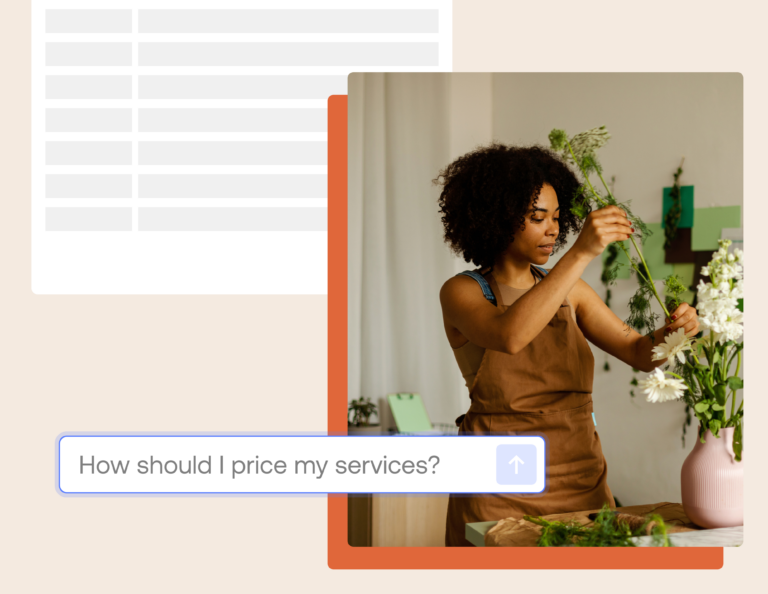Discover the benefits of a Customer Relationship Management (CRM) system and explore the top 5 choices for small businesses.

Customer relations success hinges on more than simple contact management — it’s about fostering meaningful connections, driving sales, and charting a course toward expansion. Enter Customer Relationship Management (CRM) systems.
CRMs aren’t just about managing contacts. They help your business maximize resources to ensure you brand and understand your clients. If you know your audience well enough, you’ll be able to create memorable customer experiences that will satisfy your clients and keep them coming back. Imagine effortlessly tracking leads, nurturing customer relationships, and scaling your business — all from one platform.
Whatever your business’s size, learn why you should add a CRM to its tool stack. Read on to explore the 5 best CRMs for small businesses.
Jump to:
- What is a CRM?
- How can a CRM benefit your business?
- Must-have CRM features
- The key to choosing the right CRM: Plan ahead and try before you buy
- The 5 best CRMs for small business
- HoneyBook
- Copper
- HubSpot
- Zoho
- Freshworks
- 5 tips for choosing a CRM
What is a CRM?
A CRM system is a software platform that manages client relationships for businesses. The best CRM for small businesses is a centralized all-in-one tool that helps you manage and analyze your interactions with existing customers as well as potential leads.
One of the major features of a CRM is its ability to store all of your client data in one place. You can analyze this data to help make informed decisions and predict client behavior more accurately, thereby better meeting their needs.
The data a CRM can store and analyze includes:
- Basic client information such as contact details
- Client category segmentation data such as demographics and other groupings
- Sales data such as transactions, invoices, and quotes
- Marketing data such as campaign details and analytics such as click-through rates and conversions
- Client service data such as support tickets, feedback, and satisfaction ratings
- Communication such as phone calls, chats, and email history
A centralized CRM platform also keeps all of your client interactions stored in one place for easy reference and to keep communication records. This helps you stay organized, which can be especially beneficial as your business grows. A CRM can have other features such as workflow automation, sales forecasting, and the capability to integrate your various tools and accounts.
As an independent business owner, you can use the features of CRM software to stay organized as sales and client interactions increase, provide excellent service for your clients, and increase sales and grow your business.
How to optimize any CRM in 7 easy steps
When setting up a CRM for your small business, it’s essential to approach the process with clear goals and a streamlined plan. From identifying your needs to automating tasks, each step ensures your CRM works efficiently for your business. Below, we break down how to set up a CRM system that helps you manage customer relationships effectively and avoid common pitfalls along the way. With these steps, you’ll be well on your way to boosting productivity and improving client retention.
1. Identify your needs
Before diving into any CRM platform, evaluate what specific challenges you aim to solve. Are you struggling with lead management, customer retention, or sales tracking? Understanding these areas will guide you in selecting a CRM with the features that best suit your needs. For instance, if client communication is your top priority, focus on CRM systems with strong email marketing integrations.
Pro tip: Create a list of “must-have” and “nice-to-have” features to help narrow down your choices.
Common mistake: Focusing on too many features can lead to a complex system that doesn’t address your core needs, overwhelming your team and diluting CRM benefits.
2. Choose the right CRM
Selecting the right CRM depends on your business size, budget, and specific needs. Compare systems based on pricing (monthly fees, user-based costs), scalability (can the CRM grow with your business?), and integrations (can it connect to your current tools like Google Workspace, Slack, or social media?). Consider CRMs like Zoho for scalability or HubSpot for its free features and user-friendly interface.
Pro tip: Use free trials or demo versions of CRMs to test functionality before committing.
Common mistake: Choosing a CRM that works now but doesn’t scale with future growth, resulting in costly migrations later.
3. Input your data
Migrating your data to a new CRM can be overwhelming, especially if it’s not organized. Take time to clean up contact lists, remove duplicates, and ensure that customer data is accurate. Use tools like CSV imports or dedicated migration tools to streamline this process. A well-prepared data migration makes the rest of the CRM setup smoother.
Pro tip: Start with your highest-priority data first, such as active clients and open leads, then move to archived information later.
Common mistake: Importing messy or outdated data leads to cluttered CRM records, causing confusion and inefficiency.
4. Customize
One size does not fit all. Customize your CRM to match your specific business needs by setting up custom fields, automating key workflows, and adjusting user roles and permissions. For example, a service-based business might add custom fields for project timelines, while a sales-based company can automate lead scoring. This customization ensures your CRM fits seamlessly into your workflow.
Pro tip: Involve your team in the customization process to identify their pain points and preferences for better adoption.
Common mistake: Skipping customization can make the CRM feel generic and harder to integrate into daily operations.
5. Train Your Team
Even the best CRM is useless if your team doesn’t know how to use it. Invest time in comprehensive training to ensure everyone knows how to utilize the CRM’s features, from basic data entry to advanced reporting and automation. Providing clear instructions on using automations, managing contacts, and generating reports can significantly improve productivity for your sales rep team.
Pro tip: Assign a CRM “champion” within your team who can troubleshoot issues and help others get the most out of the system.
Common mistake: Neglecting proper training leads to underutilization of key CRM features and decreased efficiency.
6. Automate
One of the most significant benefits of a CRM is automation. Set up automations for repetitive tasks like sending follow-up emails, scheduling appointments, and updating contact information, simplifying the sales process. Automating these tasks saves time and reduces human error. Be mindful not to over-automate, though—balance efficiency with personal touches where appropriate.
Pro tip: Start with simple automations (e.g., welcome emails or task reminders) and expand as you get more comfortable with the system.
Common mistake: Over-automating too soon can make customer interactions feel impersonal, affecting relationships and client satisfaction.
7. Monitor & Optimize
Once your CRM is up and running, don’t set it and forget it. Regularly review your CRM’s analytics and reports to identify trends, such as which sales strategies are working best or where leads are dropping off. Use this data to optimize your CRM settings and workflows over time, ensuring it continues to support your business as it grows.
Pro tip: Schedule monthly or quarterly CRM reviews to assess team usage, automation effectiveness, and data accuracy.
Common mistake: Ignoring CRM performance tracking leads to missed opportunities for growth and process improvements.
How can a CRM benefit your business?
By integrating a CRM into your overall strategy, you can open many doors that may significantly increase your business’s value.
- Improved Efficiency — Streamlining processes like sales tracking and lead management can save time and resources, allowing you to focus on your clients’ personal needs.
- Increased Sales — When your analytics paint a picture of your clients’ behaviors and preferences, you can begin to see who they really are. This “audience awareness” gives you a leg up on identifying sales opportunities.
- Better Decision Making — Access to real-time analytics and reporting makes you a more informed decision-maker — whether dreaming up marketing strategies or optimizing finishing touches.
- Stronger Client Retention — CRMs help nurture client relationships with features like automated follow-ups and reminders. When important details can’t slip by unnoticed, you will provide better service and gain something completely invaluable — your clients’ loyalty.
The bottom line: CRM solutions allow small businesses to manage their client relationships as efficiently as large ones. You can focus on optimizing client relationships by automating repetitive tasks and streamlining different client-facing activities like invoice generation and billing. Analytics results show you a good picture of your potential clients, and a CRM in your life could provide you with enough time and opportunity to reach them.
Must-have CRM features
When looking for a CRM, it’s easy to get caught up in flashy features and cutting-edge intelligence functionalities. But it’s important to remember that there’s a lot more to a CRM than that.
Let’s quickly highlight a few must-have features that businesses (large and small) should look for in a CRM solution.
- Lead Capture – One of the most tedious tasks small businesses deal with is lead and client data entry. Luckily, most CRMs can capture leads from different digital spaces, like web forms, live chat conversations, and social platforms. The lead management tools built into most CRMS can do it all without manual entry or editing, helping you store data more easily.
- Contact Management – You shouldn’t have to constantly be checking client profiles to make sure they’re up-to-date. If you are, your CRM is saving you little to no time. A well-built CRM offers automatic updates to contact profiles when new information is made available. But these profiles will always be easy to edit manually if you do have something to add.
- Pipeline Management – Every lead counts. You can’t afford to have any slip through the cracks. Whether it’s automated or managed by hand, your CRM solution should make it easy to move clients through your pipeline, and keep track of account statuses, so no one is missed or forgotten. The best CRM will let you view your pipeline in real-time so you always have a birds-eye view of project statuses.
- Task Automation – The point of a CRM is to make your workday easier by eliminating mundane tasks from your to-do list and ensuring everything is accurate and complete. Therefore, the best CRM for small business owners will be able to manage important tasks on its own, without any hand-holding.
- Customization – No company is the same. Processes differ, if only just slightly, from business to business. And no matter how good a CRM is, its default settings and core functionality will not perfectly meet your needs. But, top CRMs will allow you to customize your options, making sure the software can perform your desired tasks.
- Affordability – The reality is, that there are a lot of great tools out there. But not all cater to the budget constraints of small businesses. That doesn’t mean you can’t find a good option, though. The tools that truly are the best CRM for small business owners offer all the features you need (plus a few extra tools to support your processes) at a price point you can afford.
- Analytics and reporting – At a glance, any stack of raw data without context is meaningless. Luckily, the best CRMs include powerful analytics that can transform that data into meaningful ammunition. Incorporating data analysis with reporting tools renders organized, comprehensible results that help you track your clients’ trends, behavior patterns, and preferences. Getting a good handle on these brings you one step further toward improved customer relations.
- Integration with other tools – Say goodbye to app-hopping. Make sure your CRM plays nice with the other tools you use daily. Whether it’s syncing emails with Gmail or Outlook, sharing docs on Google Drive, or making a splash on social media, it’s much more efficient if everything is in one place. While bookkeeping may not be on your immediate radar, try to choose a CRM that offers Integration with QuickBooks Online.
The key to choosing the right CRM: Plan ahead and try before you buy
Let’s face it: the way you run your business is somewhat unique, and every platform may not be a perfect fit. Don’t forget to take advantage of free trial periods when looking for the right CRM for your small business.
With a free plan, you can pay attention to the core functionality of the CRM while also seeing what sets it apart. Before you try, plan ahead: document your processes ahead of time and consider how you could do things faster or differently. That way, you can better evaluate each CRM as you’re trying it for your business.

Capture leads, convert, and provide an excellent experience with HoneyBook. Go beyond a standard CRM.
The 5 best CRMs for small business
When choosing the best contract management system, make sure it has the necessary core features first. Assuming it does, next evaluate any extra features that help the system stand out, such as robust templates or document collaboration options that help simplify the document creation and management processes.
1. HoneyBook
Best all-in-one small business CRM

HoneyBook is an all-in-one business solution that doesn’t quite fit the mold of a traditional CRM. That’s because HoneyBook isn’t designed for massive corporations. It’s built specifically for small business owners and specifically those who run Independent businesses with personalized services.
Using HoneyBook, you can capture leads from your web forms, inbox, social media accounts, and more and the CRM system will automatically save their information to your account.
HoneyBook has several key features, making it one of the best options for freelancers and small business owners. It organizes everything in projects that you can title on your own to make sure they match your core services. Within each project, you can house timelines, notes, contracts, online invoices, payments, and more.
Beyond its simple organization, it also makes it easier to communicate with clients. HoneyBook automation keeps leads from falling through the cracks over time since you can respond to inquiries automatically and send follow-up messages when the leads go quiet. Using HoneyBook’s unique online proposal software, you can also send contracts and invoices at the same time to move your booking process forward faster and make it a more airtight process as well.
To make everything more simple, HoneyBook also offers file and email templates to keep your business moving forward regardless of your experience. So you don’t have the perfect language down for a follow-up email? No worries – HoneyBook will get you there faster. In essence, you can automate or streamline virtually everything in your workflow.
You don’t have to sit around and wonder if your clients have opened your emails either. HoneyBook sends you read receipts and real-time status updates to show you when clients open files, sign online contracts, and make payments. And HoneyBook isn’t just for you. Your clients can also access all of this information from HoneyBook’s centralized client portal.
But what sets HoneyBook apart as the best CRM for small businesses is its online payment software. Unlike many of its competitors, HoneyBook enables you to invoice clients directly and accept payments via credit cards, debit cards, and direct deposit once a project has wrapped. This means you can manage the client experience from end to end all in one place.
This mix of contact management, project management, easy tool integration, communication, and payment features provides business owners with the toolset they need to effectively manage their client relationships. So it’s no surprise that many consider HoneyBook to be the best CRM for small business owners.
You can get started with a 7-day free CRM plan that doesn’t require a credit card, so it’s a zero-risk way to try before you buy.
2. Copper
Best email-focused CRM

If you’re particularly attached to using your inbox for any and all business communication, Copper was built specifically for you. Designed to integrate seamlessly with Gmail, Copper can both pull customer data from your inbox and be used in a pop-up form in your Gmail account.
But its automation capabilities don’t stop with contact profile creation. With Copper, you can also create triggers for virtually anything in your workflow, like updating contact information, moving leads through your pipeline and scheduling meetings with clients.
Beyond that, Copper offers robust reporting features that make it possible for you to stay up-to-date on your sales performance. You can change parameters of reports to see specific segments of data and track individual marketing processes to see what’s working best. And the reports themselves are designed in such a way that even novices can analyze the numerical data efficiently.
So, if you’re intrigued by the concept of a CRM, but you really only want to work in your email account, Copper might just be the best CRM for your small business.
3. HubSpot
Best small business sales

HubSpot is nearly always listed on a “best CRM for small business” list. And we’d certainly be remiss if we didn’t include it on ours, as well. Being the top marketing-based CRM on the market, it’s a great option for many small businesses.
HubSpot CRM doesn’t just offer marketing tools; it also covers marketing automation, sales, and client support. It also covers sales and client support in a really genius way. By saving contact profiles in a single dashboard and saving all future communication with that contact to the same profile, all three teams (marketing, sales, and client support) can access the same information. HubSpot also scores leads based on your pre-defined criteria to help you prioritize the most important clients in your pipeline.
At the same time, team members can communicate with leads from a universal inbox, no matter where the communication comes from. This minimizes the time that might have been spent toggling between your Instagram account, inbox, and live chat platform.
If you don’t have a lot of time to send emails or communicate with clients, you can also automate much of your marketing, by triggering certain actions to happen (like a confirmation email being sent) when leads take specific actions (like signing a contract).
However, there are some drawbacks to having such a robust set of tools at your disposal. Namely, it can drastically overcomplicate things, especially during the launch and setup phase. Especially for small business owners, it can be confusing to have a tool built for customer service and marketing versus the streamlined booking process that most would prefer. So, if you’re considering HubSpot, think about whether you have the time and bandwidth to navigate the onboarding process.
It’s also important to note that HubSpot CRM is free forever, which means you can use the basic, core functionality of the CRM without paying anything, ever. That includes free marketing analytics and reporting across several marketing channels. But you’ll still need a paid plan if you’re interested in tapping into all the features that make HubSpot one of the best CRM tools for small businesses.
4. Zoho
Best for small business customer service

While Zoho is a great option for most large businesses, it was designed for the small business.
With standard lead capture, pipeline management, and contact management tools – it has all the good stuff that small businesses need. But Zoho isn’t your run-of-the-mill CRM. It’s one of the only omnichannel CRMs on the market.
What does that mean? It means that in addition to live chat, email, phone, and web form lead capture, Zoho can pull data from social media channels to populate contact profiles.
It also allows you to communicate with leads in real-time across all of these channels (and host meetings and webinars) from the CRM. That means you can effectively say goodbye to all the extra apps and tabs that are draining your battery (and your sanity). Easily integrate Zoho with all your favorite apps such as Slack, MailChimp, Microsoft 365, and Google Workspace.
And believe it or not, that’s just scratching the surface with Zoho. But again, keep in mind that more doesn’t necessarily mean better. Zoho’s massive library of features can create more confusion and increase your need for client support if you don’t have the bandwidth to use them. Zoho’s personalization capabilities also lack other versions, so you won’t have as much opportunity to create and send branded assets.
But, if you use lots of different communication tools to connect with your audience and you’re willing to sink the time into learning Zoho, it’s probably the best CRM for your small business.
5. Freshworks
Best for growing businesses focused on client support

Freshworks is a unique Saas (software as a service) that provides solutions for both big and small businesses. For small businesses, it has a suite of tools for client support, sales, and marketing – much like HubSpot and Zoho. Like the others, Freshworks also allows you to generate reports and analyze your client data. You can also integrate with numerous popular tools such as QuickBooks, Calendly, and Mailchimp, among many others.
Freshworks’ strong suit is really in client support, and it offers tools for business owners who work internationally so you can access different currencies and languages as well as territory management.
Freshworks also boasts robust AI capabilities to put your lead management on autopilot. One noteworthy aspect is its predictive lead scoring which is especially helpful for businesses that get a significant amount of leads per month and need a better way to manage them without a full-size sales team.
Overall, Freshworks is a good investment for growing small businesses looking for a bit more capabilities focused toward clients.
Keep in mind these 5 tips when choosing a CRM
- Know your priorities and goals. Clarify your core business needs, such as customer management or sales tracking, to ensure the crm aligns with those objectives.
- Determine your needs and those of your staff. Assess the features that benefit not only you but also your team, ensuring everyone can use the crm efficiently.
- Be clear on how each CRM’s feature set will help you achieve your priorities and goals. Evaluate whether the crm’s tools support your desired outcomes, like automating repetitive tasks or improving sales insights.
- Know what type of support the CRM comes with. Consider the level of technical support available, such as live chat or email assistance, and how it will help you troubleshoot issues.
- Create a budget. Plan for a crm that fits your current financial capacity but offers scalability as your business grows.
Create an outstanding client experience with the right CRM
Regardless of the type of business you run, it’s important to create a great client experience from the first meeting to the close of the contract and beyond. Customer expectations are rising dramatically, and at least 66% of customers expect businesses to understand their needs and expectations. They’re demanding better, faster and more personalized attention from the businesses they buy from.
Consider your current clients and the parts of your process they appreciate the most as well as the parts that are lacking. If your clients love personalized experiences, more efficient ways to communicate with you, and multiple payment methods then HoneyBook is the best CRM to make them enjoy working with you even more. Other CRMs won’t provide as much for the client experience, but they may fill the gaps you have in your sales or marketing processes.
When you find the right CRM system for your business, make the most out of it by taking the time necessary to set it up. The more information you provide at the start, the more powerful your CRM will be as it works for you.

Easily keep track of all your clients and projects using HoneyBook.



